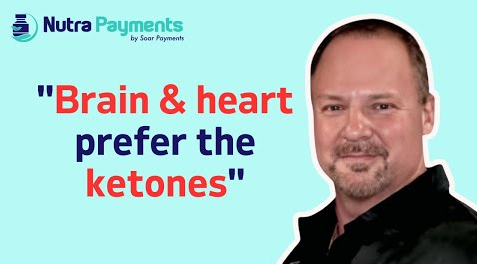Keto-what? Many people have challenges distinguishing the keto diet from other nutritional strategies because they just feel that it's another label without understanding potential underpinning mechanisms. The key differentiator here is nutritional ketosis. Ketosis is a perfectly natural metabolic state of the body where you predominantly burn stored body fat for fuel instead of glucose. Let's unpack just how you get into ketosis and what the benefits are.
Table of Contents:
-Ketones
-The Benefits
-The Ketogenic Diet
-Exogenous Ketones
-How To Test For Ketosis
-How To Use Ketosis
-Considerations
Most of us have been told that the primary source of energy for our bodies is glucose, with a need to be regularly fed throughout the day with a steady supply of carbohydrates. However, there is a more efficient source of fuel that is underutilized in most: ketones.
In the absence of standard glucose availability, the body metabolizes fat for energy and produces ketones, which are then used by you are cells to power their tasks.
By definition, nutritional ketosis is the metabolic state of having ketones in the blood, generally above .5 mmol/L. The whole concept of the ketogenic diet is to eat a diet that promotes lower glucose availability to drive your body into ketosis. We believe our ancestors had infrequent feeding times and were subject to unintentional bouts of intermittent fasting which primarily saw the body in a ketogenic state. Done nutritionally, this means eating sufficient protein, lower carbohydrates most of the time, and higher amounts of healthy fat.
Research has and is continuously being done to unpack the mechanisms and possible applications of a ketogenic diet. as of now, the main reasons people opted for this lifestyle are to improve body composition, increase mental performance, increase exercise & athletic performance, improve mood, and to prevent & treat disease.
Ketones
Ketone Categories: 3 Types are produced when the body goes into ketosis.
- Acetoacetate (AcAc): the first created from the breakdown of fatty acids, converted either into BHB or into acetone.
- Beta-Hydroxybutyrate (BHB): created from acetoacetate although not technically a ketone because of its structure it still identifies as one.
- Acetone: A byproduct of acetoacetate, it breaks down quickly and is removed from the body through the excretory systems or in the breath.
Why Ketones Are Used By The Body
Human beings have always relied on ketones for energy in the absence I'm glucose or when glucose with scarce, as we mentioned before. An example of this would be our ancestors having fewer carb options during winter. Humans are actually brought into this world at birth in a state of ketosis.
The reality is modern food availability, mainstream nutrition advice, and more all see more carbohydrate abundance than necessary for the common person. This means most people rarely access ketosis and the metabolic pathway becomes something of a road less traveled. The aforementioned periods of time where carbs we're less abundant, as well as periods of unplanned fasting and me availability all, saw human beings in states of nutritional ketosis. Because of this, our bodies are amazing at adapting to the ketogenic state.
Benefits of Ketosis
Though health and nutrition is not a one-size-fits-all commodity, the benefits that many are experiencing and can expect from nutritional ketosis are as follows:
-Better Body Composition
-Improved Mental Focus And Energy
-Heightened Fitness Level and Athletic Performance
-Better Mood And Decreased Anxiety
-Improved Insulin Sensitivity & Blood Sugar Health
-Abundant Energy
Fat Lots of Specific Benefits
-Increased Fat Burning: In ketosis, you burn dietary fat as well as your own body fat as the primary fuel.
-Appetite & Craving Regulation: Better satiety and blood sugar regulation, as well as potential ghrelin balance, means you can be better in tune with true hunger vs. cravings. The height protein, fiber, and fat content will drive satiety.
-Blood Sugar Balance: Many eat in a way that includes blood sugar spikes that can leave you feeling run-down, unfocused, and craving food again soon after eating. Ketosis has the opposite effect. Furthermore, eating quality protein, vegetables, and fat helps this process as well.
-Hormone Calibration: Ketosis helps promote regularity of hormones that affect weight. This is another driver for how ketosis can help you avoid cravings for addictive junk foods.
Cognitive Benefits
A poorly designed and or unchecked diet can lead to brain fog, decreased mental acuity, and difficulty in concentration. Many report feelings of being hyper reactionary and less clear with a poor diet.
Ketones help support the high octane energy levels of the mitochondria which in turn produce energy for cells of both body and brain. Ketones also helped improve the energetic efficiency by netting the body more units of energy also known as ATP.
The higher healthy fat content also supports our brain health because the brain is our most fat containing organ, comprised of over 60% fat. Research also shows that the brain prefers fat for fuel predominantly over glucose.
Training & Exercise Benefits
-Becoming fat adapted can help with endurance by providing the body with the main Energy system it needs to sustain performance. Your body will use oxygen more optimally and efficiently.
-Becoming fat adapted also allows the body to preserve more muscle glycogen to be used at more appropriate sparing times in training rather than spent right away.
-Spending regular time in ketosis helps improve mitochondrial function. This means that you are feeding the energy batteries of your body to optimize your overall health and physical performance found in the long run.
-Better blood glucose balance means fewer ups and downs and performance.
-Better energy availability to prevent bonking when doing exercise.
Exogenous Ketones
While we have expanded exogenous ketone guides and articles, just know that they are a supplement used for boosting health, performance, and supplying energy. They are often used as an adjunct to support a lower carbohydrate diet although they can be taken with any nutritional program to support every lifestyle. they provide your body with ketones that your body can consume for fuel that it does not directly produce on its own. In fact, the body cannot tell the difference.
How To Common Uses For Exogenous Ketones:
-Aid in the adaptation process into ketosis helping mitigate symptoms of keto flu.
-Spike clean energy without adrenal stress and caffeine at any time of the day.
-Promote satiety and craving suppression.
-A decrease in inflammation.
-Reduce anxiety and boost mood.
-Provide cognitive clarity and heightened mental performance.
Additional Benefits
-By flooding your body with higher ketone levels, you can peak the benefits of ketosis.
-Ketones improve the energy systems of the body and provide direct energy for brain cells.
-Optimizing your ketone content will help support a foundation for overall health, wellness, disease prevention, and longevity.
Where To Start With Exogenous Ketones
Try taking a morning supplement either first thing or after breakfast to kick-start your day.
Depending on your needs and other variables, consider taking a second serving in the afternoon.
Needs: Why, When And Where To Take Exogenous Ketones
-In the morning to kick-start your energy for the day.
-Pre workout is a potent natural Energy and performance enhancer.
-Between a long gap of meals during the day as you are adjusting to ketosis.
-During an energy law later in the day 2 rewire your mental performance and make you sharp as a tack. if you tolerate caffeine alright or perhaps love your morning coffee you can actually use creamer versions to supercharge your drink.
-After eating a meal that takes you out of ketosis if you are getting those initial side effects and symptoms from that first carb refeed.
-If you need energy later in the day and still want to be able to go to sleep on schedule.
The Ketogenic Diet
A ketogenic diet is an approach to eating that is higher in fat (~70%), moderate in protein (~20-25%), and lower in carbohydrate (~5-10%). These ratios were designed to mimic the effects of fasting to induce nutritional ketosis into the body. It's not just about the ratio, however-you need quality food! It's important to remember that these ratios were designed for a medical application and to induce the highest degree of ketosis. That doesn't mean that everyone needs to be on this strict of a ratio. what is more important than being perfectly in ketosis all the time for the vast majority, is being fat adapted and spending plenty of time in some spectrum of ketosis. Exogenous ketones can help optimize ketone levels so people don't have to be in a strict ketogenic regimen as well.
Carb Consumption
Conventional wisdom has a range of approximately 25 to 50 grams of carbohydrates per day for those on the ketogenic diet. You'll remember that there is some wiggle room here if you are consuming exogenous ketones and also depending on your own training style and unique body.
Fat Intake
The bulk of your calories on a ketogenic diet come from fat. Fat is considered the dominant macronutrient for a ketogenic diet. Because fats are stored in your cells for energy and because of the usual nutrient considerations with any food, it's paramount to source high-quality healthy fats.
Many also find that after the initial transition phase, they tend to lower their fat intake and increase their protein intake.
Protein Level
The standard recommendation is generally .7-.8g of protein per pound of lean body mass. The reality is that you can have higher amounts of protein than commonly recommended on the ketogenic diet. Remember that that lower protein threshold was created as a ratio for medical applications in children and that those leading an active lifestyle all the way to athletes generally need more protein and can still enjoy the benefits of ketosis.
The idea that excess protein raises glucose levels and decrease is ketone levels is, for the most part, incorrect although there are ways to eat protein in such a way that its spikes blood sugar, such as taking whey protein on its own.
The takeaway here is that these are guidelines and because of their initial reason for creation, they are flexible. It's important to get a ratio dialed in that suits you best.
Types of Ketogenic Diets
The following are the most common variations of the ketogenic diet:
-SKD: Standard Ketogenic Diet - Keto eating with the original macronutrient portions.
-CKD: Cyclic Ketogenic Diet - Regular carbohydrate research meetings that are bookended by prolonging stretches of low-carb eating that looks something like a standard ketogenic diet.
-TKD: Targeted Ketogenic Diet - Small amounts of carbohydrates are added in around exercise to optimize training performance and muscle growth
-There is also an unnamed version of a ketogenic diet that sees users higher amounts of protein depending on their own unique needs.
How to test ketosis:
Many find that testing their ketone levels helps them with accountability as well as to know how their adaptation process is going. However, we don't recommend doing this in excess forever because it can create an effect where you major in the minors and pay attention to ketone levels exclusively instead of looking at other indicators of optimal health and fitness.
The methods for measuring ketone levels are as follows:
- Urinalysis: While this is the most common way to test, we don't necessarily recommend it. this is only painting part of the picture and the truth is that if your body is utilizing ketones and your energy balance is such, you probably will not have excess ketones in your urine.
You can easily do this at home by peeing on urine strips. The easy setup and cost effectiveness of this makes it a favorite although not the most accurate.
- Blood Testing: you can pick up a home unit 2 test your blood by pricking your finger with a test stick to measure the amount of a certain ketone called BHB. This is considered the most accurate way to test your body's ketone levels, though it is also the most expensive and somewhat invasive.
- Breathalyzer: Testing for respiratory quotient helps us measure one type of ketone in the breath known as acetone. This is fairly unreliable although it can give some a proxy on where they are at.
Interpreting The Results: If your ketone levels are between .5 and 3.0 mmol, you are in some spectrum ketosis.
Theory To Practice: Applications For Ketosis
Ketosis has been shown to help directly and or indirectly with the following:
Weight Loss
Athletic Performance And Fitness
Focus and Mental Cognition
Sustainable Energy
Muscle Growth
Hormone Regulation
Longevity
Blood Sugar Rhythms
Epilepsy
Cancer
Depression
Anxiety And Stress
Inflammation
Migraines
Alzheimer's And Neurodegenerative Disease
Please understand that this and all the information in the sky is not meant to be a substitute for medical advice from a qualified healthcare practitioner. We recommend consulting with a qualified healthcare professional prior to making any changes to your health regimen.
Keto Considerations
Dehydration: Nutritional ketosis comes with less glycogen which means you'll have less hydration. Remember it's in the name carbo-HYDRATE! Also, eating quality food in general decreases inflammation. While losing this water retention is, on the whole, a good thing, there's no distinguishment made between good essential hydration and the unwanted chronic inflammation. Ketosis also lowers insulin levels which allow fluids to be released because insulin prevents sodium excretion.
What this means is that you'll want to be supplementing with electrolytes or perhaps an exogenous ketone supplement that has electrolytes already built in.
Potential side effects during the initial phase of ketosis adaptation can include:
-Headaches
-Fatigue
-Poor Mood
-Stomach And Digestive Issues
-Nausea
-Poor Mental Cognition
-Decreased Physical Performance
Solutions
-Eating the right ratios of food from the right sources to get enough energy and proper nutrients.
-Time-give your body a chance to adapt.
-Be sure you're on top of your sleep.
-Drink a high volume of good quality water.
-Add natural salt and electrolytes.
-Supplement with exogenous ketones.
For more information, you can download our keto adaptation guide.

 ACCOUNT
ACCOUNT
 CART
CART





